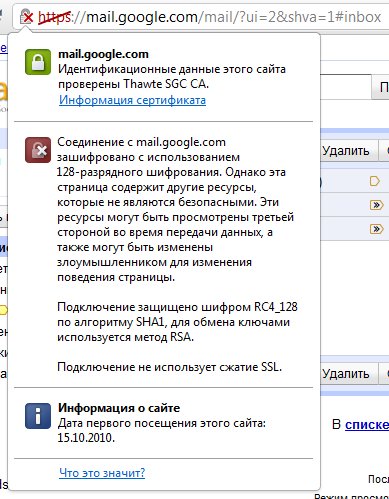Answer the question
In order to leave comments, you need to log in
SSL issue in GMail?
I came across this on other sites, but when it began to appear in the mail, my patience snapped and I decided to find out.

What could be the reason for this?
Insecure resources that can be modified by an attacker to change the behavior of the page - is it some kind of js passed through plain-http?
How can you find out which resources are triggering this warning?
update
During the night, Windows installed a couple of updates (probably not essential, but for the sake of completeness) and rebooted the PC. Now I go to GMail - the error is not reproduced.
By the way, the error persists in Google Reader, but it is inevitable there, since multimedia content is transmitted from the original sites via http, now I will read Reader without encryption.
Many experimental functions of the laboratory are included.
Chrome browser, only Google Mail Checker Plus is installed from the extensions.
Thanks for Developer Tools -> Resources, I'll try how the problem repeats.
I already tried this method on another site with the same problem, the reformal widget loaded via http turned out to be a problem there.
The time and timezone are not reset.
Installed Kaspersky Crystal, but did not find SSL verification in its options.
But I agree with pwlnw that the error would have been different then. In addition, the error would be on all SSL sites, and not on some.
Answer the question
In order to leave comments, you need to log in
Is that Chrome? Ctrl+Alt+J -> Resources, there you are looking for files downloaded via http.
Once there was a similar problem - it turned out that the time and time zone were lost on the computer. I set the time and the correct belt, cleaned the cookies and cache and everything fell into place. This solution is mentioned in the google chrome support forums.
Today I also heard about such a problem from a friend, although I do not observe it myself. Do you have any of the experimental features of the lab turned on?
What antivirus do you have?
Kaspersky has a function for checking secure connections... which allows exactly this behavior...
Didn't find what you were looking for?
Ask your questionAsk a Question
731 491 924 answers to any question